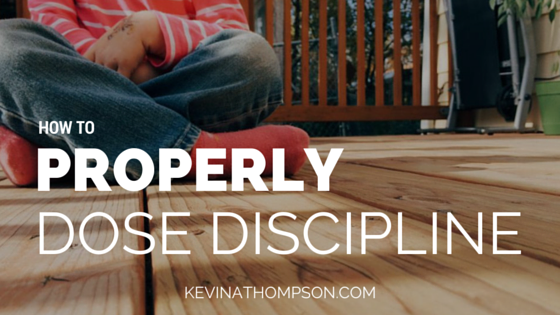One of my favorite Ella stories of old illustrates her stubbornness. She was supposed to spend the night with my sister. Ella loves her aunt, and the sleepover would give me and Jenny a night to ourselves.
The afternoon of the event, Ella was doing something and wouldn’t stop. After several trips to timeout for her actions, I told Ella, “If you do that again, I’m going to call Aunt Leigh and tell her you can’t spend the night.”
Ella coldly looked at me and said, “Call her.” (See: Eight Leadership Lessons Ella Taught Me in her First Eight Years)
But I didn’t want to call her. I wanted Ella to spend the night so I could have my date night. Ella knew my threat was empty so she had no problem calling my bluff.
Decisions have consequences.
If there is anything we need to teach our kids, it is that they control a good amount of their lives based on the decisions they make. When they make bad decisions, they get bad consequences. Most of the time, good decisions will result in good consequences.
Discipline is the main tool in the parenting tool box to teach the connection between choices and outcomes. (Video: A Parent’s Most Effective Tool in Discipline)
Parents must continually define negative consequences, which will be experienced if a child makes bad choices. These are most effectively communicated through simple, “If…then…” statements. By connecting the consequences before the choices are made, it empowers the child to own their decisions and removes emotion from the punishment process.
Yet, there is a common mistake many parents make regarding discipline. They threaten consequences they would never carry out. They exaggerate consequences with the hopes the threats will better convince their children to make good choices.
- “If you don’t stop, I’ll never let you _____ again.”
- “If you don’t obey, you are grounded for a month.”
- “If you keep doing that, we aren’t going to grandma’s for Christmas.”
While these exaggerations may result in faster obedience in a few circumstances, the pattern greatly undermines effective parenting in the long-run.
It creates instability in the lives of our children. They need to learn that different choices have varying levels of consequences. Some choices matter more than others. Small choices of disobedience will have small negative consequences. Significant choices of disobedience will have more drastic consequences. Whenever we create a big consequence for a small choice, it confuses our children.
It undermines a parent’s credibility. While parents can’t be perfect, we must be seen as a reliable source of truth. Whenever we threaten a consequence we are not willing to carry out, we are lying to our children. Eventually they will understand we are lying. Not only will they stop taking our threats seriously, this pattern will erode our trust in other areas. (See: My Four Favorite Parental Statements)
There is a basic premise parents need to remember when it comes to determining negative consequences. Pharmacists often talk about the minimum effective dose of a medication. What is the smallest amount of a pill someone can take and still reap most of the benefit.
In the same way, parents need to consider the minimum effective dosage when it comes to discipline. Instead of exaggerating negative consequences, parents need to minimize punishments to the smallest amount necessary. (See: A Simple Trick for Teaching Your Kids Respect and Gratitude)
Instead of threatening to take away electronics for the whole weekend, why not threaten to take them away for the next hour.
Instead of saying they can’t go to their friend’s party, make the first consequence that they have to be thirty minutes late.
Instead of claiming that you are going to take away their family vacation, say their actions are going to prevent them from getting ice cream one night during the trip.
The smallest consequence possible is a far better form of parenting.
It clearly communicates a change of behavior is needed. The consequence may not be major, but it is an outcome the child does not want. It forces them to consider their actions.
It creates wiggle room. One of the biggest problems with exaggerating consequences is the parent has no where to go if they need an additional punishment. By starting small, a parent can work their way up if the child continues to disobey.
It makes it easier to stay true to your word. Holding kids accountable for small consequences is far easier than carrying out the grand threat. By making it easier on parents, we are far more likely to do what we say which causes kids to trust us more. (See: No Lies/No Slang)
A good amount of disobedience is the result of parents making idle threats they would never carry out. By threatening and not delivering, kids (and even parents) begin to understand the emptiness of their words.
One of the most important skills for a parent to learn is to NEVER threaten a consequence they are not willing to enforce. We must continually show our children that when it comes to discipline, we are not joking. Our word is true. The best way to ensure this is to use the minimal discipline possible.




4 Responses to How to Properly Dose Discipline